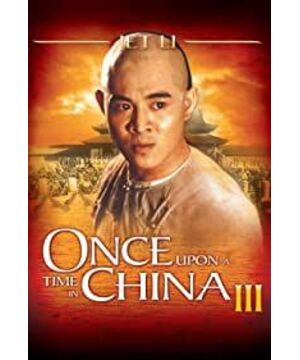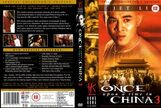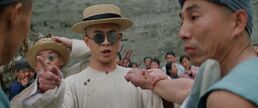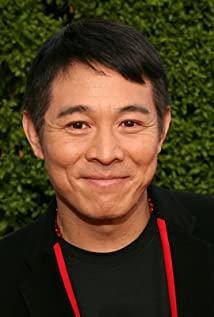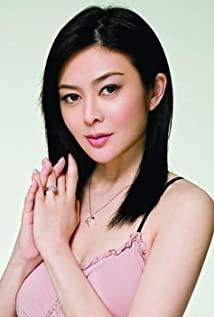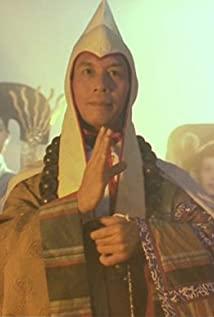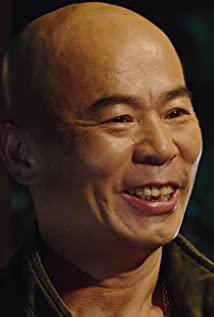Some people say that Tsui Hark is the Jin Yong of the film industry, and they take it for granted. Tsui Hark perfectly blends various factors and themes into one, both solemn and harmonious, elegant and vulgar, entertaining, yet serious. It’s like Jin Yong, who explored profound philosophical issues such as traditional Chinese culture, thought, human nature, religion, belief, and life value through martial arts novels, a literary form that is labeled as “orthodox literature” as difficult to be elegant. It is broad and profound; it is rare to have both fascinating plots and unrestrained imagination at the same time. It can not only attract the public with a curiosity, but also make literary masters ashamed; whether it is a recreational reader with an entertaining mood, or An anatomical scholar with a research attitude will read the book and be amazed by it. Tsui Hark's Once Upon a Time series (only the first three in this article, namely the three starring Jet Li and Rosamund Kwan: "Top Gun", "Men Be Self-improvement", "The Lion King") are also like Jin Yong's novels Same. Among the dazzling good-looking punches and kicks and exciting fighting competitions, there are also profound historical reflections. Through this series of films, Tsui Hark expressed his own view of history and his thoughts on the historical fate of Wanqing China when it faced "unseen changes in thousands of years". It can be said that Tsui Hark's Once Upon a Time series has a more serious core than the general Once Upon a Time movie.
Tsui Hark's views are different from the traditional arguments in history textbooks, especially when dealing with the issue of the eastward spread of Western learning and the process of the westernization of middle school (which also includes the Chineseization of Western learning), he showed a more cautious and scientific attitude. Hong Kong was under British colonial rule for more than 100 years and was deeply influenced by Western culture. It is quite different from the mainland in terms of political system, economic system, cultural concept, way of life and thinking habits. And these three films (91, 92, 1993) when the film was filmed and released, Hong Kong had not yet returned and was still under British rule. Tsui Hark, who grew up in such a cultural background and studied abroad in the United States, naturally has a different perspective and thinking logic when looking at problems. He has a more personal experience of the historical changes in the late Qing Dynasty when the Chinese and Western cultures collided and blended with Chinese and Western cultures. When looking at Western culture, we can get rid of extreme national sentiments, stand on the standpoint of history, and uphold a more fair and objective attitude. From the movie, we can clearly see Tsui Hark's criticism of the mechanical patriotism underpinned by the extreme national sentiment, and he used Huang Feihong to expose and attack it mercilessly. This theme runs through the entire series, and has become one of the main lines of thought and plot development in the second part. At the beginning of the second part, Huang Feihong, Aunt Thirteen and Liang Kuan encountered a street parade of white lotus followers. Because they don't understand what the camera that Aunt Thirteen was taking pictures of, the people of the White Lotus Sect thought it was a demon girl who was carrying a monster and wanted to arrest her. Therefore, Huang Feihong confronted them, and after a few moves, he saw its essence clearly, and dismissed it as an evil demon and a fool. In the latter part of the film, when he and Lu Haodong went straight to the white lotus altar, he was always gentle and polite. In the fight, Huang Feihong, who punched three points, was full of anger, and he attacked mercilessly. In fact, the White Lotus Sect was reflecting the Boxing of Gengzi Yihe at that time, with the slogan of "Fu Qing and destroying foreign countries", fighting against foreign powers, defending the family and defending the country, trying to save the rotten and precarious Qing Dynasty. However, compared with the national justice and patriotism recorded in the history books from a macro perspective, Tsui Hark went deep into the historical life and discovered the superstition and inhuman cruelty under the patriotic carnival from the microscopic perspective. "Humanism has nothing to do with politics, nationality, and culture." It was such a common-sense belief that Tsui Hark saw the absurdity in it. The believers of the White Lotus Sect rarely take the initiative to fight against foreign powers in the film. Instead, they repeatedly harass churches and hospitals, slaughter foreign unarmed missionaries, doctors, old and weak women and children, and even burn to death "foreign dogs". Although Huang Feihong hated the foreign powers and their invasion made China's great rivers and mountains shattered, he has repeatedly shot to rescue the foreigners in China from the torches and knife-edges of the White Lotus Sect. This is only because of his "humanitarian" feelings. In any case, life is the most precious, and the indiscriminate killing of innocents, even with the banner of serving the country and the people, cannot conceal the essence of its collective atrocities.
Of course, Tsui Hark, who is as good at using the official history to construct the historical environment for interpretation like Jin Yong, must also know the deeds of the Taiping Rebellion in the late Qing Dynasty when he reflected the extreme actions of the Boxers against Western culture and religion. Hong Xiuquan borrowed imported Christianity, and after sinicizing its teachings, used the power of religion to gather people's hearts. Similarly, the superstition of the White Lotus religion seems to be the best means of uniting people. Because to the Chinese people who are deeply indulged in the inertia and inertia generated by the past thousands of years of history, they are like a group of people who have been living in dilapidated thatched houses, accustomed to the simple, cramped but safe environment of thatched houses. Resist change. Faced with the sudden upheaval that forced them to move out of the dilapidated house, they instinctively felt a threat, so they would rather be superstitious in the myths of the past than accept the surgery that could cure the disease but was accompanied by great pain. This is why the role and power of religion becomes apparent when the ocean is flowing. However, because of the unsafe strangeness of foreign religions, the degree of recognition is extremely low, and Hong Xiuquan can only make some changes to make it local. The White Lotus Sect adopts the mythological system and symbols of Chinese folk tradition, so it is not surprising that it is welcomed by the people. In the film, the White Lotus Sect often parades in the streets, and its ceremonies are similar to the traditional folk religious activities - the Yingshen Games, which are welcomed by the people. The owner of the hotel where Huang Feihong and his entourage stayed even hurriedly offered the sesame oil money with both hands. After obtaining the safety talisman, he immediately pasted it on the pillar in front of the door, and kept reciting: add more sesame oil to keep safety... In the film, Facing this scene, Lu Haodong shook his head secretly and sighed, which was actually an expression of Tsui Hark's helpless feeling, because the whole national character was like this, and it could not be changed all at once by one person. This mood turned white-hot to the point of despair when she faced the little girl who thought she was invulnerable with a lantern. At that moment, Lu Haodong murmured like a person who suddenly had nothing and was at a loss and was at a loss: Where are you going? No one left, if all the Chinese people are like this, is there any help? ... At that moment, people really couldn't help but feel the feeling of "mourning their misfortune, angering them indisputably".
This leads to another deeper idea of Tsui Hark, which is to expose and explore the national character, as well as the possibility and method of its change. The portrayal of the people's mental outlook and life mentality in the film is even more penetrating, reflecting Tsui Hark's insight into the national character of the late Qing Dynasty. The strength of his use of the lens is no less than that of Lu Xun's pen. The shots throughout the series depict this with precision, simplicity, fluidity, and brilliance. The portrayal of each villain's character can be described as vivid and impressive, but the most exciting part is not this, but the words and deeds of ordinary citizens expressed by the extras. From the first installment of the series, details like this are all over the place. For example, the head of the first Chinese opera troupe politely sent away the thirteen aunts who came to take pictures with a smile on their faces, and just turned around and cursed: Humph, fake foreign woman, dressed better than a costume Fancy. In the scene where Liang Kuan and Zhu Rong confronted the Shahe Gang, Liang Kuan threw a pig’s feet and hit the leader of the Shahe Gang. A member of the Shahe Gang said to his head, “Brother, how do you step down?” Surrounded to watch the lively, street vendors shouted: Bozai cake, eat Bozai cake to watch the fight. One person responded: Come to a bowl of bean curd flowers; there are even teahouse workers pouring boiling water from upstairs to scald the people below, shouting: It's not lively enough, let's water it, it will be more lively. The owner of the teahouse was charged protection fees by the Shahe Gang. Huang Feihong stepped in to help and captured the first villain. When he asked everyone to testify, everyone scattered in a hurry. One second, there were "crowds of people", and the next second was deserted. The teahouse owner just gave up. Witness? I don't want to think that the owner of the stage is surprised and scattered all day long. You are in there to learn martial arts. I didn't see the fight, and I don't want to know. For example, in the second part, the musicians in the teahouse, when the Western missionaries passed downstairs, accompanied by the increasingly loud "Hallelujah", signaled to each other: "Here comes again", and then pulled harder and harder. Try to raise the volume and try to overpower the opponent. Street parades held banners and shouted against the Treaty of Shimonoseki and against seeking peace with Japan, but there was this dialogue in the teahouse: - Where is Taiwan? Why did you cede it to others after the war was over? -Where is Taiwan? Taiwan must be by the sea, otherwise what is the name of the bay? - How big is that place? - I don't know either, the provincial capital can't take care of it, so what else? Have some tea. Let's talk when we're full. Another person shouted: You are full! When Aunt Thirteen appeared on the streets of the provincial capital wearing a dress, there was a lot of discussion among men, women and children, and a girl even poured blood on her. For example, in the third part, the three gangs fought in the street for the lion king. Huang Feihong intervened and wanted to compete with the three masters. for fun. At the Hetou banquet in Sanxiaolou, when Huang Feihong proposed to jointly sign a letter, the other party members cooperated passively. All of this detracts from the Chinese people's "dirty, messy, noisy, fighting in the nest", insensitive, unsympathetic, conservative, face-loving, timid and patient, lack of public spirit, mutual suspicion, hypocrisy of words and deeds, etc. Revealed. On the contrary, when Huang Feihong's Baozhilin was set on fire by the Shahe Gang and burned to the ground, it was a Western missionary who took the initiative to act as an eyewitness. Such a stark contrast is thought provoking. It is precisely because of having such citizens that the Bailian cult and Red Lantern Zhao (a heretical sect similar to the White Lotus sect that appeared in the fifth "The Wind of the King") will be unscrupulous and popular. However, even if Huang Feihong's martial arts are more powerful and eradicated, it will eventually cure the symptoms but not the root cause, and it is difficult to guarantee that "Red Lotus Sect" and "Huang Lian Sect" will not appear again. Raising the soup to stop the boiling can only stop the chaos for a while, and drawing wages from the bottom of the pot is the complete solution. Therefore, the fundamental thing is to treat the ugliness of the people. The result of the film's thinking on this issue is shown in what Huang Feihong said to Li Hongzhang at the end of the third part. "The so-called brave man is fearless, the benevolent is invincible, and the most important thing is to practice martial arts to strengthen the body. The most important thing is to combine wisdom and martial arts. If you can't broaden the wisdom of the people, and only have hands and feet, how can the country be rich and the people are strong?" Only by broadening the wisdom of the people and carrying out scientific enlightenment , the sleeping oriental dragon and the descendants of the dragon will wake up in the dream of thousands of years, break the shackles of the dark room and the mind, and see the dawn of a new era. Tsui Hark integrated this kind of martial arts thought with national concern, and completed the design of his martial arts philosophy for Huang Feihong, which is in line with Jin Yong's masterpiece through Guo Jingzhi's mouth, "The great man is the best for the country. People's martial arts spirit complement each other. It can be said that Tsui Hark's martial arts spirit is a kind of "Confucian chivalrous" spirit, and he actively joined the WTO. From the beginning of "New Dragon Gate Inn", the knights in Tsui Hark's lens all lamented the history and were worried about the country and the people. Zhou Huai'an, even "The Invincible Swordsman in the East" is no exception. The heretical sect similar to the White Lotus Sect that appeared in "The Wind of the People") will be unscrupulous and popular. However, even if Huang Feihong's martial arts are more powerful and eradicated, it will eventually cure the symptoms but not the root cause, and it is difficult to guarantee that "Red Lotus Sect" and "Huang Lian Sect" will not appear again. Raising the soup to stop the boiling can only stop the chaos for a while, and drawing wages from the bottom of the pot is the complete solution. Therefore, the fundamental thing is to treat the ugliness of the people. The result of the film's thinking on this issue is shown in what Huang Feihong said to Li Hongzhang at the end of the third part. "The so-called brave man is fearless, the benevolent is invincible, and the most important thing is to practice martial arts to strengthen the body. The most important thing is to combine wisdom and martial arts. If you can't broaden the wisdom of the people, and only have hands and feet, how can the country be rich and the people are strong?" Only by broadening the wisdom of the people and carrying out scientific enlightenment , the sleeping oriental dragon and the descendants of the dragon will wake up in the dream of thousands of years, break the shackles of the dark room and the mind, and see the dawn of a new era. Tsui Hark integrated this kind of martial arts thought with national concern, and completed the design of his martial arts philosophy for Huang Feihong, which is in line with Jin Yong's masterpiece through Guo Jingzhi's mouth, "The great man is the best for the country. People's martial arts spirit complement each other. It can be said that Tsui Hark's martial arts spirit is a kind of "Confucian chivalrous" spirit, and he actively joined the WTO. From the beginning of "New Dragon Gate Inn", the knights in Tsui Hark's lens all lamented the history and were worried about the country and the people. Zhou Huai'an, even "The Invincible Swordsman in the East" is no exception. The heretical sect similar to the White Lotus Sect that appeared in "The Wind of the People") will be unscrupulous and popular. However, even if Huang Feihong's martial arts are more powerful and eradicated, it will eventually cure the symptoms but not the root cause, and it is difficult to guarantee that "Red Lotus Sect" and "Huang Lian Sect" will not appear again. Raising the soup to stop the boiling can only stop the chaos for a while, and drawing wages from the bottom of the pot is the complete solution. Therefore, the fundamental thing is to treat the ugliness of the people. The result of the film's thinking on this issue is shown in what Huang Feihong said to Li Hongzhang at the end of the third part. "The so-called brave man is fearless, the benevolent is invincible, and the most important thing is to practice martial arts to strengthen the body. The most important thing is to combine wisdom and martial arts. If you can't broaden the wisdom of the people, and only have hands and feet, how can the country be rich and the people are strong?" Only by broadening the wisdom of the people and carrying out scientific enlightenment , the sleeping oriental dragon and the descendants of the dragon will wake up in the dream of thousands of years, break the shackles of the dark room and the mind, and see the dawn of a new era. Tsui Hark integrated this kind of martial arts thought with national concern, and completed the design of his martial arts philosophy for Huang Feihong, which is in line with Jin Yong's masterpiece through Guo Jingzhi's mouth, "The great man is the best for the country. People's martial arts spirit complement each other. It can be said that Tsui Hark's martial arts spirit is a kind of "Confucian chivalrous" spirit, and he actively joined the WTO. From the beginning of "New Dragon Gate Inn", the knights in Tsui Hark's lens all lamented the history and were worried about the country and the people. Zhou Huai'an, even "The Invincible Swordsman in the East" is no exception.
In the film, Tsui Hark showed an optimistic attitude towards overcoming the old habits of the people and the future of the nation. The words Lu Haodong said when he said goodbye to the children in the school before the second part went straight to the White Lotus Forum: In any case, you must survive tonight, so that your generation can see the rising sun of tomorrow... .. We can see that Tsui Hark's attitude is optimistic. No matter how deeply rooted the national character is, under the new type of education, it will gradually change. No matter how stubborn the disease is, as long as you find the right prescription and use the right medicine, there will always be a problem. Healing day. There is a sharp contrast between the little girl and the classmates in the school. Although there are still the next generation who are deeply bewitched by feudal superstition, there are also a new generation of children who have been enlightened by science. These children come from all over the world and speak different dialects, indicating that The modernized values of freedom, science, and democracy will eventually spread to every corner of this rapidly ancient land, bringing dawn to the Chinese nation.
These subtle, slowly changing shadows are vividly reflected in Huang Feihong himself. There is no such person as Aunt Thirteen in history, and Huang Feihong does not have a relative named Aunt Thirteen at all. The design of this character in the film is meaningful. The love between Huang Feihong and Thirteenth Aunt is not only about love, romance, love and affection, but also a symbolic meaning of the collision, friction, exchange and integration of Chinese and Western cultures. Huang Feihong is a typical traditional Chinese. He is elegant and modest, abides by etiquette, emphasizes respect and order, maintains the dignity of teachers and Taoism, abides by the way of the mean, is prudent and patient, conservative in thinking, traditional and simple, but all this is in the thirteenth aunt. After studying in the UK, things changed quietly. Aunt Thirteen is a new woman who has received a modern Western education. She is completely different from traditional Chinese women. She breaks the boundaries of generations and boldly shows her heart and love to Huang Feihong. , economy, science and other advanced concepts were brought into Huang Feihong's life, which gradually changed Huang Feihong's life and thinking. The barriers of traditional culture and the bottom line of traditional thinking that seemed insurmountable were broken and crossed. Even Huang Qiying, Liang Kuan, Guizu Qi and others were all affected. It can be said that Thirteenth Aunt was the enlightenment teacher of Huang Feihong's modernity, and also heralded the eastward spread of Western learning and the possibility and evolution of Chinese and Western interoperability.
Tsui Hark's fair and objective attitude towards Chinese and Western cultures is most evident in Huang Feihong and Sun Wen's combination of Chinese and Western medicine to save people. Tsui Hark did not overly elevate Western culture, nor did he completely reject Chinese culture. With idealization and romanticism, he showed China's broad and profound medical technology and concepts to Western medicine. In fact, Wong Fei-hung's acupuncture technique may not have been so sophisticated. But this kind of film technique perfectly achieves the purpose of expressing this idea.
Another thing I have to mention is Tsui Hark's skilled shooting skills, precise lens language and superb environment construction and reproduction techniques. One of the most exciting examples is in the second part, an old man who sells songs in the rivers and lakes, in his hoarse and sad erhu and desolate and desolate singing, the camera constantly switches, and in just a few minutes, the complex, turbulent and devastated society of the late Qing Dynasty is transformed. It was shown, with the lyrics of blood and tears, which made people feel sad. The creation of scenes, especially in troubled times, has always been Tsui Hark's specialty. Such details are everywhere in the entire series of films, which is impressive and has to admire the ingenuity of the director. This talent is also reflected in works such as "A Chinese Ghost Story" and "Burning the Red Lotus Temple". Writers use the pens in their hands to control the text with perfection and ease. Tsui Hark also uses his camera lens to use sounds, colors, scenes, and actors in a masterful way. Tsui Hark's talent is indeed rare, and he lives up to the name of "Old Monster Xu". In just a few shots, the creation of the scene, the contrast of the atmosphere, and the verve of the characters are ready to show. The scenes in these films are so real that you can't see the slightest trace of chiseling. Seeing these pictures, it seems to see the Chinese people's life scenes of friction, collision and fusion of Chinese and Western cultures in the late 19th and early 20th centuries. This kind of empathy isn't hindered or blocked by you sitting in front of a computer in a room surrounded by high-end tech, or sitting in front of a giant screen in a modern movie theater with Coke popcorn in hand. But now we see a lot of so-called costume movies and TV dramas, but there are too many scenes, and those environments and scenery are not modern, ancient or ancient, and nondescript.
However, Tsui Hark's historical reflection and national concern did not attract the attention of moviegoers. Most of the public came with an entertainment mentality and an interest in the skills of Kung Fu Emperor Jet Li, and they all relished Huang Feihong's performance. Shadowless feet and Shaolin boxing, but through his mouth, those "sermons" that enlighten the people's wisdom, strengthen the body, unite, and make the country prosperous and safe for the people are not a word. There are several meaningful scenes in "Once Upon a Time in the Western Regions" directed by Sammo Hung and supervised by Tsui Hark. Huang Feihong is calling on everyone to unite and love each other, trying to wake up the overseas compatriots who are numb, follow the rules, and don't think about progress. At that time, everyone was drowsy. When Huang Feihong repeated these words at the "Baozhilin 1st Anniversary Celebration" later, the audience did not fall asleep this time, but they stared at Huang Feihong as if they were looking at a monster. Even when Huang Feihong was about to speak at the end of the film, everyone politely asked him to leave quickly, so as not to delay the schedule. This is a true portrayal of the situation in the industry after Tsui Hark's Once Upon a Time series appeared. This kind of feeling ends up as a "preaching" in the face of film entertainmentism. I don't know if this is Tsui Hark's self-deprecation, or Sammo Hung did it deliberately after reading Wong Fei Hung and Tsui Hark in the previous films.
Throughout the film industry, there are only a handful of directors who can make martial arts movies with such a high style and depth, and Tsui Hark is one of the best. Therefore, it is biased to regard Tsui Hark only as a commercial director. The epic works of the Wong Fei-hung series have become classics in Hong Kong film history. Although his "sermons" have not been accepted by the market, good works are not based on whether they can please the market, audiences or so-called film critics. The value standard is whether it has enough depth and thickness to withstand the erosion of the tide of time and still talk frequently, giving people reflection and inspiration. This, Tsui Hark did. We should remember that in addition to the four great masters of Jin Guliang and Wen, there is also a Xiangjiang eccentric "Xu Laogua". He and Jin Yong, a director and a novelist, have constructed and interpreted the magnificent world of martial arts in different ways. The ethos of a generation is a well-deserved "two walls of martial arts", and they are all worthy of "the great hero".
View more about Once Upon a Time in China III reviews


